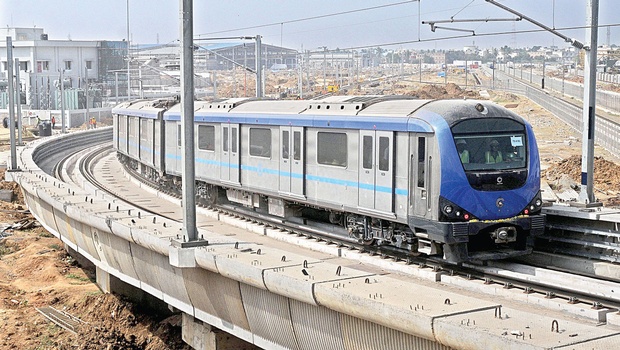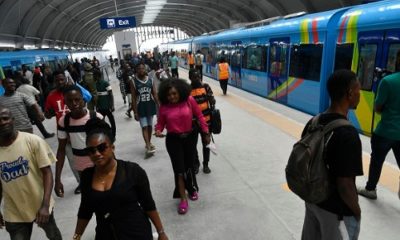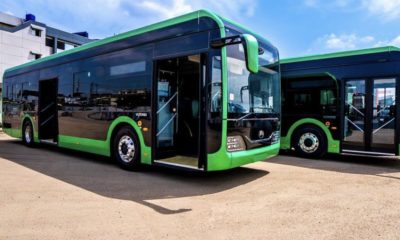Finance
Lagos metro rail transit to cost N456bn, says MD, Infrastructure Bank

ABUJA – Mr Adekunle Oyinloye, Managing Director, The Infrastructure Bank Plc, has said that the proposed Lagos Metro Rail Transit (LMRT) project will cost N456 billion (2.4 billion dollars).
Oyinloye said in an interview in Abuja on Wednesday that the project was expected to cost so much because it involved fixed infrastructure – tracks, stations and rolling stocks.
“We still have some paper work to do with Lagos State for concession. Immediately the concession is done and we have a bankable document and get to finance close then the project will start.
“We are hoping and believing that within the next six to eight months we will be able to get to finance close and we will start,’’ he said.
Oyinloye said the bank was a member of the consortium which created the Marina Express Train Services and partnering to construct the rail line known as “Red Line’’ project.
“Infrastructure bank is also the transaction advisor and finance arranger for the project. It bided for the Red Line project which started since 2008.
“When we got the preferred bidder status, the right of way was not available so we had to work with Lagos Metropolitan Area Transport Authority (LAMATA) and Lagos State Ministry of Transport.
“We also had to work behind the scene with the Ministry of Transport to ensure that the right of way was granted,’’ Oyinloye said.
The right of way for the proposed Iddo-Agbado corridor for Lagos Metro Rail Transit, known as “Red Line’’, was handed over to Lagos State in Abuja on Friday.
Oyinloye expressed gratitude to President Good Luck Jonathan for granting the right of way for which the construction could start.
“There will be changes in the landscape of Lagos. There are about 1.8 million passengers daily who currently spend about four hours daily to get to work and another four hours to get back.
“After the completion of the project, the passengers will now need 30 minutes or maximum of 45 minutes to get to their destinations in a cosy train services.
“If you are living in Agbedo or Agege and you work in CMS area or Victoria Island or you do business in Oke-Arin and Balogun Market you do not need more than 45 minutes to get to your destination,’’ he said.
Oyinloye said the proposed project was delayed due to transfer of asset from the federal to state government which required a lot of engagement and involved several ministries and departments.
The Commissioner of Transportation, Lagos State, Mr Kayode Opeifa, said the project would create direct and indirect jobs during and after the construction.
“It will reduce the cost of transportation and save money for citizens; it will improve our mass transit system by moving more people within a shorter period by decongesting the road and managing the traffic accurately.
“There will be low greener gas emission from the cars and people will be able to move their goods to the market with cheaper rate and more efficient way.
“We are going to link the state and improve tourism. The blue line runs east west from Okukumaiko to Marina while the Red Line runs west to south from Ogun State end to Lagos,’’ he said.
Opeifa, however, said that once the concession was concluded, construction would start with the work expected to last three or four
years.
Mr Dayo Moberuola, Managing Director, LAMATA said the project was initiated by the organisation.
Moberuola said LAMATA identified the need for rail mass transit in Lagos because the state was a mega city and required a backbone for transportation.
“We estimated that 20 million people are moving on daily basis presently in Lagos and in 2030 it is going to be 32 million people that will be moving on daily basis.
“And we can’t do all of that by road rather it has to be done by rail mass transit that is why rail is very important.
“We need to connect to neighbouring city of Ogun State where about 20 to 30 per cent of people who are actually working in Lagos live.
“So by building this rail line it will enable these set of people to be coming into Lagos to work and go back in the evening thereby creating more productivity,’’ he said.
(NAN)
Banking
CBN Denies Currency Devaluation

The Central Bank of Nigeria (CBN) has refuted claims of devaluing the.
Earlier reports suggested that the CBN had devalued the Naira, lowering its exchange rate from N631 to the dollar, compared to the previous day’s rate of N461.60 at the Importers and Exporters (I&E) window.
However, the Central Bank of Nigeria (CBN) released a statement on Thursday through its Acting Head of Corporate Communications, Dr. Isa Abdulmumin, categorizing the report as false information.
In the statement titled ‘CBN Has Not Devalued The Naira’, he said the attention of the apex bank was drawn to the news report by an Abuja based newspaper edition of June 1, 2023, titled “CB Devalues Naira To 630/51”.
However, the CBN stated categorically that the news report was replete with outright FALSEHOODS and destabilizing innuendos, ‘reflecting potentially willful ignorance of the said medium as to the workings of the Nigerian Foreign Exchange Market.’
“For the avoidance of doubt, the exchange rate at the Investors’ & Exporters (I&E) window traded this morning (June 1, 2023) at N465/USS1 and has been stable around this rate for a while.
“The public is hereby advised to ignore the news report by Daily Trust in its entirety, as it is speculative and calculated at causing panic in the market,” the CBN spokesman added.
He, therefore, advised media practitioners to verify their facts from the Central Bank of Nigeria before publishing in order not to misinform the public.
Banking
BREAKING: CBN Increases Interest Rate By 0.5%

The interest rate in Nigeria has been raised to 18.5 percent, up by 0.5 percent, from 18 percent where it was pegged in March 2023.
The Central Banks of Nigeria’s (CBN) Monetary Policy Committee (MPC) resolved to this effect at its third meeting of 2023 in Abuja, on Wednesday.
Governor, CBN, Godwin Emefiele, made the disclosure in the communiqué of the MPC’s meeting, thereafter.
While engaging the media at the end of the two-day meeting, Emefiele, said the committee voted to keep the asymmetric corridor at +100 and -700 basis points around the MPR.
In the view of the MPC, rising inflation rate is traceable to the high energy cost and challenges around the supply chain, among others, which lie outside the corridors of the CBN.
Emefiele said, “The current trend in price development would continue to be monitored by the bank with greater collaboration with fiscal authority to address the drivers of inflation.”
Biztellers reports that the CBN had effected six consecutive interest rate increases, which has seen the rate move from 11.5 percent in March 2022 to 18.5 percent in May 2023.
Finance
Dangers Lurk As Nigerians Resort To Refurbished Gas Cylinders

In Nigeria, people have been forced to come up with creative solutions to cope with the effects of inflation and the economic crisis.
These improvised strategies have not only helped individuals save money, but also enabled them to stay afloat during difficult times.
In a concerning development, the recent trend of boycotting the high cost of cooking gas cylinders in Nigeria may pose a greater risk to lives than it does in terms of saving money.
Economy&Lifestyle investigations have revealed that the soaring prices of gas cylinders have reached a point where it has become increasingly challenging for average households to afford them, let alone refill them with gas.
The situation is further exacerbated by the fact that the pump price of kerosene, which would typically serve as an alternative, has become prohibitively expensive.
Upon investigation, it was found that the prices of gas cylinders vary depending on their sizes. A 3kg gas cylinder is priced at N14,000, while a 5kg cylinder costs N16,000. The larger cylinders are even more costly, with a 6kg cylinder priced at N17,000 and a 12.5kg cylinder costing N19,000.
Additionally, the expense continues when it comes to filling these cylinders with cooking gas, as it costs N2,600 for a 3kg cylinder, N5,200 for a 6kg cylinder, N8,950 for a 10.5kg cylinder, and N10,650 for a 12.5kg cylinder.
Consequently, an average household that needs to replace a worn-out 5kg cylinder would have to come up with N20,250 to purchase a new cylinder and fill it with gas, which can be a difficult feat to achieve.
As a result, many people have resorted to refurbishing their old cylinders and trying to use them as best as they can. However, this approach poses a significant danger.
Mrs. Rukayat Adesoji, a trader, shared her experience regarding her gas cylinder, which had become rusted and could no longer stand upright since last month. Due to the exorbitant prices of purchasing new cylinders, she resorted to seeking the assistance of a welder.
The welder patched the legs of the cylinder, repainted it, and ever since then, she has been using the refurbished cylinder for her cooking needs.
She said ““My gas cylinder which was 6kg got rusted and no longer stands erect since last month. When I asked for the price, I was told it was N17, 500. I was discussing it with a friend who advised me to take it to a welder to paint it and construct a new stand. I heeded to her advice and at the end spent just N3, 000 to turn my cooking gas to a brand new.”
Apart from refurbishing cylinders, some people don’t even know when their cylinders will expire. Mrs. Mercy Opara, a hair stylist, falls in that category as she explained: “I am taking my gas cylinder to the welder to spray it for me. It just cost N1, 500.
“The cost of buying a new cylinder is high. I have been using my cylinder for over 7 years and I don’t even know the expiry date. I just pray God blesses me so that I can buy a new one. But this one I am managing will look neat after spraying it for another two years.”
Mr. Adekanbi Joseph, a wielder, said he paints cylinder and “To paint and rebuild a cylinder stand, I charge N4, 500. Many people come here to paint as a new cylinder is now very expensive to get.”
Highlighting the potential dangers of using refurbished cylinders, Mr. Benjamin Hope, the Chief Executive Officer of FKT Cooking gas and general goods, emphasized the risks involved.
He stated that even a brand new cylinder can pose a risk of explosion if the locks are not properly secured after use or if the cylinder filled with gas is moved from one location to another.
He said “A brand new cylinder can explode if the locks are not well keyed after using and if the cylinder filled with gas was moved from one place.
“There are many reasons for the high cost of gas cylinders in Nigeria. One is the cost of importation due to the exchange rate. Another is the increased migration from the use of kerosene to cooking gas which has necessitated increased demand for gas cylinders. You know that in such a case there will be increased importation of cylinders.”he added
















